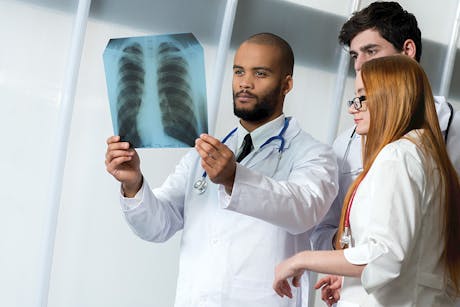If you smoke now or were a smoker, a low-dose CT scan can detect cancer at an early stage, when it’s most treatable.
In most cases, lung cancer doesn’t have symptoms until it is life-threatening. Early detection through a lung cancer screening can protect your health and possibly save your life. Talk with your health care provider to learn if a lung cancer screening is right for you. A free lung cancer screening could be available to you through Screening for Life.

Who should be screened:
Anyone 50 to 80 years of age who is a current smoker or a smoker who quit within the last 15 years who smoked 20 pack years or higher. Pack years can be calculated by multiplying the number of cigarettes you smoked per day by the number of years you smoked.

Eligibility tool
Find out if you should get a lung cancer screening.
A lung cancer screening is a low-dose CT scan. This type of lung screening can find lung cancer at its early stages, when it is most treatable. Learn if you are eligible.
- 50 to 80 years of age
- Current smoker or a smoker who quit within the last 15 years
- Calculated pack years of 20 or higher*
*Your pack years can be calculated by multiplying the number of cigarettes you smoked per day by the number of years you smoked.
Updated in April 2021
Causes
What causes lung cancer?
You are at greater risk for lung cancer if you:
- Use tobacco products
- Have been exposed to secondhand smoke
- Are a heavy alcohol user
- Eat a diet low in fruits and vegetables, and high in cholesterol
- Have been exposed to asbestos, paint, mustard gas, and other chemicals
- Have been exposed to radon gas and/or air pollution
- Have a family history of lung cancer
- Have a personal history of tuberculosis
Eligibility
You are eligible for a screening if you:
- Are 50 to 80 years of age
- Are a current smoker or a smoker who quit within the last 15 years
- Smoke or smoked a pack a day for 20 or more years, or two packs a day for 10 or more years
Screening should be discontinued once a person:
- Has not smoked for 15 years
- Develops a health problem that substantially limits life expectancy or the ability or willingness to have curative lung surgery
Updated in April 2021
Helpful links
Quit Smoking
There are two ways to get help to quit smoking from specially trained counselors: Call the Delaware Quitline by phone at 1-866-409-1858 or visit QuitSupport.com.
Learn moreHealthy Living
Live better. Our Healthy Lifestyle Map will show you where you can find fresh local produce at farmers’ markets and how to stay active at local fitness centers and parks.
View Healthy Lifestyle MapActivity Lowers Your Risk for Certain Cancers
Access the Centers for Disease Control and Prevention Physical Activity and Cancer chart to see how regular physical activity can lower your risk for eight cancers.
Learn more


